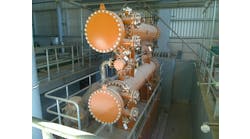Despite the late but necessary change of venue from a Katrina-devastated New Orleans to Orlando, Fla., February’s Informex 2006 trade show confirmed the growing importance of custom manufacturing and toll processing to the chemical industry. The event drew more than 4,000 visitors, a level matching the previous year, in spite of the logistical nightmare faced by CMP Information, Princeton, N.J. and London, U.K., which had bought the show in 2005 from the Synthetic Organic Chemical Manufacturers Association (SOCMA), Washington, D.C. Meanwhile, the 500 exhibitors, including 110 first-timers, set a record.
Further evidence of the strength of the sector is CMP’s commitment to make Informex a global event, starting in China in November — a sound decision judging by the 76 companies from that nation exhibiting at Orlando, the second largest contingent after the 285 from the U.S. Traditionally, though, Informex has acted as a shop window for SOCMA members involved in custom manufacture and toll processing to display their capabilities. Much of their expertise lies in their knowledge of particular chemistries and having the know-how and equipment to run the relevant processes more efficiently and economically than their clients can in-house.
But there is another side to toll processing. It involves the companies that arguably have the best possible know-how and hardware — for the simple reason that they are the equipment manufacturers themselves, offering toll processing services that utilize their own products.
Solid experience
An example of this type of toll processor is Hosokawa Micron Powder Systems, which has its Custom Toll Processing and Technical Center in Summit, N.J. Equipped with all the company’s well-known brand names — such as Mikro-ACM air classifying mills, Alpine fluidized-bed jet milling systems and Mikro-Pulverizer hammer-and-screen milling systems — the center boasts the technical and process know-how to handle most powder-processing requirements.
Center manager John McGovern notes that the longer process runs in tolling can help fine-tune the equipment and process design. “You may run into some problems you wouldn’t anticipate in a short run,” he says. “That’s definitely one advantage, but another one is being able to keep the customer focused on you.” In other words, if a company has run tests on Hosokawa equipment and followed up with some interim toll processing before committing to buying, it is less likely to take its business elsewhere.
Not all customers opting for tolling will go on to purchase equipment, of course. McGovern estimates that around 25% do, although he says “you often see a long gestation period, where we might be custom processing for a company for two to three years as they develop their market.”
He says that customers most often request jet milling on the Alpine AFG fluidized-bed opposed jet mills which can produce very fine, 10-μm or smaller, particle sizes. “Along with that, we also do a lot of formulation work,” he adds, “where we mix materials and then mill that composite.”
Hosokawa’s toll customers generally come from the industrial chemicals and minerals sectors, with processing requirements ranging from small test samples all the way to runs of up to 500,000 lb/yr. “We have an unusual set-up,” explains McGovern, “in that we have a stand-alone test lab and a stand-alone toll processing facility.” This allows customers to progress all the way from preliminary feasibility work to being supplied with equipment fully proven in toll processing.
Fluid Energy Process and Equipment, Hatfield, Pa., also maintains its own lab facility for testing and producing small-scale batches, while operating an extensive toll-processing operation across its two powder-processing divisions. “The processing division has much more volume than the equipment division and traditionally larger profits,” notes Steve Baxter, executive vice-president.
With 20 process stations offering capabilities ranging from precrushing to jet milling, classifying and drying, the division can handle most operations in the 0.5-μm to 200-mesh range.
Baxter says having both equipment and powder-processing divisions “is a great advantage. We get a lot of leads for equipment from people who aren’t ready to buy right away, but we can get them going by producing small lots of product. Then if they don’t want to buy equipment, we can carry on and produce millions of pounds for them. But if they do want to buy, then it’s a turnkey deal because they have been processing on our equipment anyway.”
Another long-standing player in the jet mill market, the Jet Pulverizer Company, Moorestown, N.J., has a custom processing operation at the facility where it manufactures Micron-Master mills. Offering milling, processing, pulverizing, micronizing and custom grinding “from small batches to truckloads,” the toll processing operation features precision jet milling from 40 μm down to 0.5 μm.
European initiatives
Micro-Macinazione, Molinazzo di Monteggio, Switzerland, which produces Chispro jet mills and mainly focuses on the processing of active pharmaceutical ingredients, has set up a custom micronizing service with a capacity of more than 1,000 metric tons per year, claimed to be the largest in Europe.
Meanwhile, Niro A/S, Copenhagen, Denmark, recently opened a test facility for its new Swirl Fluidizer, which transforms pastes, filter cake and highly viscous liquids into a fine, homogeneous powder in a single process step, at the company’s main test station in Søborg, Denmark. Here more than 35 different pilot plants are available for feasibility and pilot-scale testing on samples from a few grams up to hundreds of kilograms per hour.
Although not providing full-blown custom processing, the test center nevertheless offers Niro customers the chance to evaluate equipment like the Swirl Fluidizer in short-run projects before making a purchase. A similar test station is operated in the U.S. by Niro Inc., Columbia, Md. However, the company’s marketing manager, Mads Skaareborg, emphasizes: “There is a sharp distinction between contract manufacturing and testing. There is no doubt that contract manufacturers do use Niro equipment, and Niro has built its own facility in Copenhagen, but we don’t have contract manufacturing as such in the U.S.”
Teaming up
An equipment maker can certainly benefit from working directly with a toll processor that uses its hardware and helping that processor build up a good working relationship with customers. A case in point is the collaboration between the grinding-and-dispersion-equipment specialist Netzsch, Exton, Pa., and toll processor Custom Processing Services (CPS), Reading, Pa.
“We have a great strategic alliance,” explains CPS’ president Greg Shemanksi. “They don’t own us, we don’t own them, but we have a great working relationship in that we provide their testing on the dry milling side, and they have a wonderful test lab with some small custom wet grinding. What we are able to do is to use their equipment in real world situations so their potential customers can come in and try out grinding machines in a processing plant. That’s a benefit for Netzsch. And on our side if people just want to fill a gap before they purchase equipment — whether they are waiting to build up a market, or have to do test marketing, or find the right formulations before they invest — then they can go ahead and use our tolling services until that happens. So there’s a definite benefit for both of us.”
Typical of the equipment used by CPS is the CGS 100 fluidized-bed jet mill from Netzsch-Condux, Hanau, Germany, which at the time of its installation in 2003 was the largest mill of its type at any tolling operation anywhere.
Powder processing is clearly an operation that lends itself to toll processing. As Shemanski says, in many cases the client company might be developing a new product and has decided to defer investment in equipment until a market for it has been established, or might want to address new markets for an existing product by grinding it finer or blending it with another product. These are probably more strategic decisions than those that can apply to toll processing involving some of the more esoteric unit operations.
Special separations
The processing of heat-sensitive materials is one area that often requires esoteric technology. It is the forté of Pope Scientific, Saukville, Wis., a manufacturer of wiped-film molecular stills, evaporators and fractionation equipment that also operates a toll processing service. Dean Segal, vice-president of sales and marketing, says that with today’s increasingly complex molecules, “you can soon reach the stage where you need molecular stills — because there’s no other way to process them [without degradation] — yet there’s still very little being taught in the chemical engineering schools about the technology.”
A consequence is that many of Pope’s customers are prepared to work with the company on developing a process all the way from the lab bench through the pilot stage and on to Pope doing toll processing on the jointly developed process equipment. “An important example of this to us,” says Segal, “is the hybrid still, where we marry together a fractionation column and a wiped-film evaporator to get the highest purity of heat-sensitive materials. In some cases it’s the only answer — separating fatty acid esters of different chain lengths, for example. It works great for that and has become important for us, both as a product line and for toll processing.”
Another specialist separation process available in the tolling market is supercritical fluid extraction (SCF). Ken James, director of technology for Supercritical Fluid Technologies, Newark, Del., says that awareness of the technology in the early days of the company was quite low but has been on the increase since around 2000. “In many ways though,” he goes on, “it’s still a relatively new technology and a lot of our clients like to be able to do a feasibility study on their process and products. So we need a full feasibility and processing lab facility for them. It’s a driver to keep moving them forward, to get them into the comfort zone where they will want to make the capital investment in the equipment.”
“On rare occasions we will get a client who wants nothing to do with the equipment, who just wants to send material for us to process and send them back the extracted material,” says James. The founder and CEO of competing SCF company Thar Technologies, Pittsburgh, Pa., Lalit Chordia makes a similar point: “People come to us and say ‘you guys are the experts. You tell us what to do.’
We do everything — if they want us to license a process, or if they want us to produce a piece of equipment to install in their plant, or if they just want us to process their material, we can do it.”
Powder-processing tollers also have clients that take the “hands off” approach. “We have some customers that essentially are working out of an office. We receive materials, warehouse them, process them and then distribute them. It’s almost a virtual company set-up, with customers acting more or less as materials brokers,” says Hosokawa Micron’s McGovern, for example.
Fluid Energy Processing and Equipment can also take on much more than simply processing materials for its clients. “We do direct shipping to many of our customers’ customers,” explains Baxter, “and for some of our major customers we maintain a 30-day supply of the product we’re providing for them.”
Toll processing customers of that stature, of course, may never be the biggest purchasers of equipment — Fluid Energy has been toll processing for some customers for more than 20 years, for instance — but the synergy stemming from both manufacturing process equipment and demonstrating its capabilities to potential customers through toll processing has clearly been of great benefit to both sides of the marketplace.

